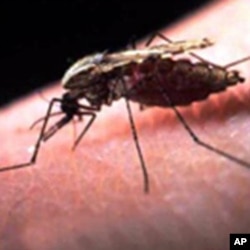Scientists have discovered a promising new drug candidate that could be used to treat malaria. They used an old technique to find the new compound.
"This is a very potent drug," says Scripps Institute drug researcher Elizabeth Winzler. "And it's exciting because it's currently more potent than most of the existing anti-malarial drugs and it's also a new chemical class."
One of the most challenging issues facing pharmaceutical researchers is finding new drugs to combat malaria. The disease affects hundreds of millions of people worldwide annually, and kills millions of them.
More than a decade ago, researchers thought their work was largely complete. They were celebrating the power of artemisinen medications to fight malaria. Artemisinens work quickly, and they are successful at treating even the most severe cases of the disease. But, frustratingly, malaria parasites have started to become resistant to artemisinin.
Winzler says a part of the problem is improper use of these powerful anti-malarial drugs, such as not taking the entire dose which can allow parasties to mutate and become more resistent to the drug.
Historically, malaria parasites have been quite effective at developing resistance to medications. So, researchers always need to have something new in the drug development pipeline. But finding new drugs is challenging.
Winzler worked with an international team of researchers to test tens of thousands of chemicals that might have some action against malaria. It's an old technique of drug discovery, test lots and lots of compounds and see if any are effective. The traditionally slow process has now sped up, thanks to robotics and computer technology.
"We screen through about 5,000 compounds, but we have also screened through about two million in total," Winzler says. "And we didn't go into this with any preconceived idea of what would be a good drug target, we just look for anything that could kill the parasites."
The one promising possibility they found is a compound called NITD609. It worked well in mice, killing malaria parasites in one dose.
Winzler says NITD609 has been tested on larger animals and there have been no problems yet. The next step is to test it in some healthy volunteers to make sure it doesn't make them sick.
According to Winzler, if the drug is successful, it still could take up to five years to reach the market place.




